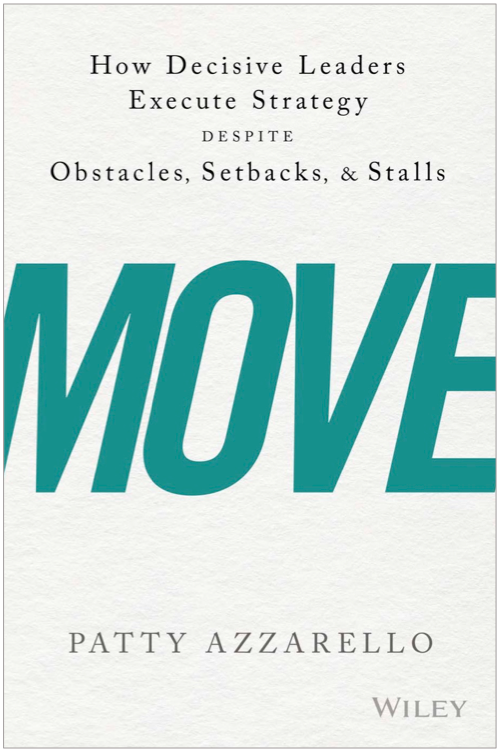Habits that drive accountability
Many leaders struggle with how to hold people accountable for effective execution. What should you do when someone misses a deadline or a commitment?
What does accountability look like specifically?
One of things that sets organizations with a high capacity for execution apart from those that struggle, is that they pay attention to creating good habits on even on small things.
Small Crimes
Two small things I see in corporations that degrade execution in big ways are late meetings, and not addressing missed deadlines.
1. Late Meetings
Late meetings may not seem like a big deal, in fact most organizations laugh it off, “Yeah, we’re really bad about that around here”.
When everyone is chronically late to meetings, and you don’t address it, you are sending a cultural signal that: We are not serious about what we say we are going to do.
If instead you set and enforce an expectation that meetings will start and end on time, and they do – not only do you get the huge benefit of cost and time savings and more productive meetings —
— You get the additional, even-bigger benefit of an expectation in your organization that it matters here what we say and commit to.
“You’re Late”
When someone is late to a meeting, address it. You are late. This meeting started at 9:00. It’s 9:04. Did you not understand that this meeting started at 9:00? What will you do to ensure you will not be late again?
At this point everyone will be cringing, but no one will be late again! It really only takes one time.
— People will start thinking, if our reaction is this serious to someone being late to meeting, it’s going to be a really big deal if we don’t deliver!
The good, small habit of reinforcing on-time meetings can directly lead to the important bigger habits. People will think and feel: We are very serious about managing our schedules, commitments, and business.
2. Missed Deadlines
The other related, rampant behavior I see is that deadlines come and go, and nothing happens…
Often it may seem like a small thing… We agreed to review the new website landing page on Thursday and we didn’t. The world did not come to an end.
So no one mentions it.
This seemingly small non-reaction to a small missed deadline, when multiplied over and over again, sends a very loud and strong signal that there are no consequences here for missing deadlines.
By not communicating, you ARE communicating:
Your communicating that, “We don’t really care about missed deadlines. It’s no big deal.”
“This is Unacceptable”
The small habit to develop is that no matter how small a deadline seems, if it is missed it must be addressed.
There must be a conversation. Every time.
You don’t need to fire someone every time something small goes wrong, but you do need to address it.
Have the conversation.
This is unacceptable. You did not deliver. What happened? What is your proposal to recover? How do you propose we now get this finished AND address the customer/sales/market issue this has created? How will you ensure this does not happen again?
Even if the end result seems the same…the new date has still slipped 2 weeks out, the fact that you had the conversation will resonate far beyond this one deadline.
If you always have the conversation, (a small habit) it will help your organization see and feel that you are serious about execution, and that schedules and commitments really do matter.
And then the next time people will think, if I miss a deadline, something uncomfortable is going to happen.
Sure, it can be uncomfortable to have a conversation about missed goals and consequences…
But if you miss a goal, it should be uncomfortable! That’s the point.
People will start self-managing and delivering on time to avoid those uncomfortable conversations. That’s what accountability feels like.
Having a conversation (a small habit) makes execution (a big, difficult thing) easier to manage.
Difficult and Required (but worth it)
Sure, this is not the fun and exciting part of any job — keeping track of commitments and following through when things go wrong.
But I have found that it actually doesn’t take a lot of enforcement to create better habits, and move the culture to be more accountable and execution oriented.
The small things automatically drive the big things.
What do you think?
Join the conversation about this on my Facebook page.
Was this useful?
If you found this article useful, please help me share it with others and encourage them to subscribe to this Blog for free.
Work with Patty
Contact Patty to do a virtual Keynote or webinar/workshop for your organization, or to talk about her video-based Leadership Development Programs which can all be delivered virtually, and include live coaching with Patty for your group.
ABOUT PATTY:

Patty Azzarello is an executive, best-selling author, speaker and CEO/Business Advisor.
She became the youngest general manager at HP at the age of 33, ran a billion dollar software business at 35 and became a CEO for the first time at 38 (all without turning into a self-centered, miserable jerk)



